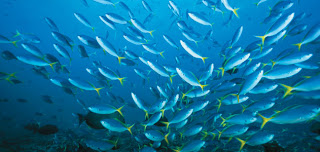A marine biologist named Greg Stone has had a huge influence in protecting the marine life of the Pacific Islands. He was blown away by his first expedition into the ocean surrounding the Republic of Kirbati in 2000 at the sight of such an abundance and diversity of the species located there. He claimed the area was "the last unexplored oceanic coral reef archipelago in the world." Upon going back to thank the president for allowing his visit, he learned that the island's primary (and basically only) source of income was allowing nations to fish there. Stone was not fond of the thought that over-fishing might occur, nor that Kirbati only made 5% income off of what nations were able to sell, so he proposed an idea where the island would be funded through protection services. While the process took years of planning and the banning of commercial fishing is only finally being put into effect this year, his help mad
e the Republic of Kirbati the largest marine life protected area
at the time the process was agreed upon and declared in 2006. Unfortunately, Kirbati is predicted to become the first country to completely disappear due to climate change, a process that will continue for the next 50-100 years.

The increasing temperature has already had an impact on the coral reefs located there, and they are what allows for such diversity as it is a coral reef ecosystem. A few years ago temperatures peaked and along with the abundance of sunlight in the area, it caused the reefs to be bleached. I researched this, and bleaching kills algae known as zooxanthellae. According to this website, "Zooxanthellae provide nutrients and oxygen to the coral through photosynthetic activities, allowing their host to direct more energy toward growth and constructing its calcium carbonate skeleton". As Stone mentions, the ecosystem in Kibati was fully restored after just six months because climate change is the only problem facing the region (as opposed to having a combination of problems such as over-fishing, toxin induced disease AND climate change), showing nature's own restorative power. This is a topic that we have discussed a lot in class and I found Greg Stone's mention of it very significant in why the reef has been able to thrive. I am very glad that Stone and his team researched the area before it was completely taken over by a money-hungry corporation, however it is really upsetting that despite the island being 700 miles away from the nearest airport, it is still impacted by our industrial habits.
No comments:
Post a Comment